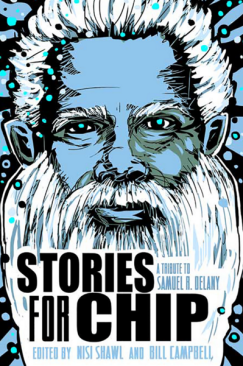 PICKING UP Stories for Chip: A Tribute to Samuel R. Delany, one is inevitably drawn to read for Delany. The genre of the tribute anthology — this one collecting 33 pieces of fiction and nonfiction (a remarkable 24 of which were written originally for this volume) in order to celebrate the achievement, influence, and genius of Samuel R. Delany — invites a search for the author and his influence. What themes or subject matter from Delany’s rich and varied oeuvre might we see referenced or reimagined in the collection? What echoes of language, style, or description might be heard?
PICKING UP Stories for Chip: A Tribute to Samuel R. Delany, one is inevitably drawn to read for Delany. The genre of the tribute anthology — this one collecting 33 pieces of fiction and nonfiction (a remarkable 24 of which were written originally for this volume) in order to celebrate the achievement, influence, and genius of Samuel R. Delany — invites a search for the author and his influence. What themes or subject matter from Delany’s rich and varied oeuvre might we see referenced or reimagined in the collection? What echoes of language, style, or description might be heard?
We can read for Delany’s impact on the various traditions that his work has famously inhabited and transformed — SF, fantasy, pornography, autobiography, African-American literature, and queer fiction, among others. We might read for the presence of identity categories — black and queer — that have marked his critical and popular reception. We wouldn’t necessarily be wrong in taking such an approach. After all, two of the most common interview questions asked of Delany throughout his career have to do with these critical obsessions of genre and identity: Why does Delany write SF? (Or the condescending version — why write SF as opposed to high literature?) How has being a “black, gay writer” impacted his writing? (Even more narrowly — how does such and such character or theme reflect his experiences as a black, gay man?)
To be sure, one quickly finds in Stories for Chip an astonishing variety of genres: interstellar, planet-hopping SF like Delany’s Stars in My Pocket Like Grains of Sand or Babel-17; sword and sorcery as Delany deployed it in his Nevèrÿon series; queer fiction echoing Delany’s Dark Reflections and, most recently, Through the Valley of the Nest of Spiders. One also finds deeply nuanced and committed explorations of racial, sexual, and class identities that show the way Delany expanded fields of writing in relation to identity. But to draw connections between the short fiction collected in Stories for Chip and Delany in this way would be to reduce genre to a static set of conventions and to regard identity as a hard shell in need of cracking.


